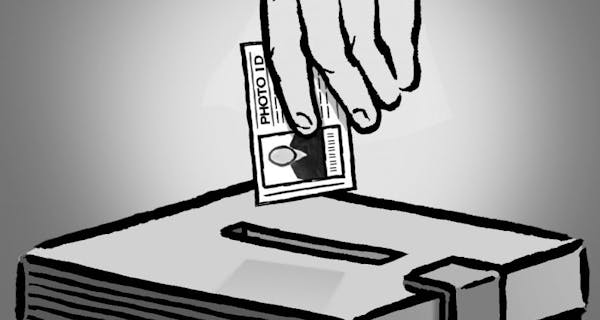Counterpoint
An Oct. 5 commentary from former U.S. Sen. Norm Coleman requires clarification, both in terms of his assessment of how our election system works and in his characterization of the opposition to the voter-restriction amendment.
Coleman is correct that the Minnesota secretary of state's website recommends that voters who need to register at the polls bring a current photo ID if they have one. It really is the easiest way to register. He then notes that there are exceptions to this requirement, but is too quick to dismiss their importance. Those exceptions are vitally important in ensuring access to the polls for as many eligible voters as possible.
The proposed amendment not only narrows the IDs that are acceptable for election-day registration, but extends the requirement to already registered voters with no exceptions. Even states like Indiana and Mississippi that have passed strict identification requirements allow for exceptions for some voters.
We all agree that confidence in our election system and the accuracy of election results is important if voters are to have faith in our system. Nobody disputes that or believes that there is an "acceptable" level of fraud, as Coleman says about the opposition. Quite the contrary, opposition to the amendment is based on sound research that shows that the amount of voter fraud is dramatically overstated, and that a photo ID requirement is an ineffective and costly solution to any fraud that may exist.
Those of us opposing this amendment believe that any change to our elections system must consider both the security of our elections and the impact that changes will have on access. Just as fraud can undermine confidence in election results, so can a system where large numbers of people are kept from voting. It is well-documented that significant numbers of senior citizens, people with disabilities and low-income voters do not have the paperwork needed to comply with ID requirements. Their votes count, too.
This is not about whether or not there is an acceptable level of fraud; the amendment would do little or nothing to fix the fraud that has been detected. Rather, it is about whether or not there is an acceptable number of voters who will be denied their ballots if the amendment is approved.
For those who believe that identification requirements are not a barrier to voting, I ask that you consider the callers League of Women Voters talks to every election day. They include the man we helped on the day of the last primary election who is homeless and does not have access to his documents. They include the woman trying desperately to help her elderly mother who had recently moved and had been too sick to stand in line to update her identification, but who wanted to vote at the polling place in the lobby of her new residence.
They include the many people we talk to every election who want to vote but who, for many reasons, don't have a current state ID. Under Minnesota's current laws, we are almost always able to find a way to help these citizens participate in our democracy. If the amendment were to pass, that access would be in jeopardy.
To make matters worse, because of all the questions about the proposed amendment that were left unanswered by the Legislature, we cannot even tell people what they would need to do to keep voting. Nobody can say for certain what IDs would be acceptable.
The amendment would introduce a new type of voting called provisional balloting whereby some voters would have to go through many steps to have their ballot counted, but we don't know what those steps would be. Language that would be put into our Constitution (but which does not appear on the ballot) says that all voters would have to undergo "substantially equivalent identity and eligibility verification," with no hint about how that could work for election-day registration or absentee voting.
All of these unanswered questions have elections officials perplexed as to how they would implement this amendment and what the cost would be to local taxpayers. That is why elections officials around the state are expressing serious concerns about this proposal. It is becoming obvious that the amendment is much more complicated than supporters claim, with unknown and unintended consequences.
Nothing about this amendment makes our system easier, more accessible, or more secure.
----------------------
Laura Fredrick Wang is executive director of the League of Women Voters Minnesota/LWV Minnesota Education Fund.

